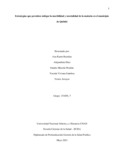Mostrar el registro sencillo del ítem
Estrategias de intervención para la prevención de la Malaria.
| dc.contributor.advisor | Aguirre, Laura Patricia | |
| dc.coverage.spatial | cead_-_palmira | |
| dc.creator | Gamboa Arévalo, Yasmin Viviana | |
| dc.creator | Perafan Gaviria, Sandra Marcela | |
| dc.creator | Arzayus Portilla, Yesica | |
| dc.creator | Diaz Cruz, Alejandrina | |
| dc.creator | Bastidas Valenzuela, Ana Karen | |
| dc.date.accessioned | 2021-06-09T14:30:18Z | |
| dc.date.available | 2021-06-09T14:30:18Z | |
| dc.date.created | 2021-05-24 | |
| dc.identifier.uri | https://repository.unad.edu.co/handle/10596/41371 | |
| dc.description.abstract | Dentro del presente trabajo se trata de establecer estrategias de mitigación de la malaria a partir del Análisis Situacional en Salud “ASIS,2019” del departamento del Chocó por enfermedades infecciosas por vectores, para dicha investigación se escogió el municipio de Quibdó y por ende la enfermedad de “la malaria” midiendo de cierta forma la magnitud del brote de esta enfermedad (la malaria) dentro de la población en riesgo. Por ende, es importante saber que el departamento del Chocó aporta la mayor proporción de casos de malaria del país y Quibdó es el municipio que históricamente aporta el mayor número de casos de malaria con más incidencia del departamento. Esto nos permite incursionar en estrategias y metodologías para estudiantes de 12 a 18 años, de promoción y control de la malaria de igual manera, el mayor énfasis en cuanto a estrategias nos debemos focalizar en la afluencia de la enfermedad, la participación activa de la comunidad, donde como estrategia base se debe seguir promovido el control de la malaria, en sus diferentes funciones como en la oportunidad de diagnóstico y tratamiento, control selectivo de vectores en malaria, el fortalecimiento de la vigilancia de la salud pública sobre todo en la participación intersectorial e intersectorial de forma que la comunidad aprenda y adopte hábitos en prevención de la malaria y así evitar más contagios sobre la comunidad en general. | |
| dc.format | ||
| dc.title | Estrategias de intervención para la prevención de la Malaria. | |
| dc.type | Diplomado de profundización para grado | |
| dc.subject.keywords | Estrategias de intervención de la Malaria | |
| dc.description.abstractenglish | The present work tries to establish malaria mitigation strategies based on the Health Situation Analysis "ASIS, 2019" of the department of Chocó due to infectious diseases by vectors, for this research the municipality of Quibdó was chosen and therefore the disease of “malaria” by measuring in a certain way the magnitude of the outbreak of this disease (malaria) within the population at risk. Therefore, it is important to know that the department of Chocó contributes the highest proportion of malaria cases in the country and Quibdó is the municipality that historically contributes the highest number of malaria cases with the highest incidence in the department. This allows us to venture into strategies and methodologies for students between 12 and 18 years of age, for the promotion and control of malaria in the same way, the greater emphasis in terms of strategies should be focused on the influx of the disease, the active participation of the community , where as a basic strategy the control of malaria should continue to be promoted, in its different functions such as the opportunity for diagnosis and treatment, selective control of vectors in malaria, the strengthening of public health surveillance, especially in intersectoral participation and intersectoral so that the community learns and adopts malaria prevention habits and thus avoid further contagion in the community in general. | |
| dc.subject.category | Salud Pública |















